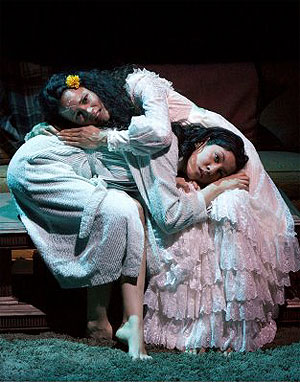Lydia at the Mark Taper Forum
April 20, 2009 Leave a comment
 The players in this play are the Flores family and they, like millions of Mexican aliens living the U.S., are trying to live the American dream that may seem to be a bit out of reach.
The players in this play are the Flores family and they, like millions of Mexican aliens living the U.S., are trying to live the American dream that may seem to be a bit out of reach.
For a struggling family like this, their deep-rooted heritage is a barrier to the new world and their hopes and dreams have been placed on the hands of their children. Octavio Solis’ Lydia quickly strips off the top layer to reveal a dark and immensely moving drama.
Set in the border town of El Paso across the way from the city of Juarez in the 1970s, the play focuses on Rosa (Catalina Maynard), her abusive alcoholic husband, Claudio (Daniel Zacapa), and their three children: Micha (Carlo Alban), Rene (Tony Sancho), and Ceci (Onahoua Rodriguez).
The play focuses on Ceci and moves between a world that is all about diaper changes and oatmeal dinners to the vivid world inside her head that, sadly, no one will ever understand.
Though each one has their personal issues to deal with, as a unit, they must contend with the completely dependent Ceci, who suffered a brain injury from an accident a few days before her confirmation a few years earlier. To help around the house, Rosa has hired an illegal alien as a caretaker for their daughter.
Lydia (Stephanie Beatriz) enters the family like an unwanted houseguest and sets out to air their dirty laundry by seducing each member in her own way. In particular, she quickly develops a deep connection with Ceci as she is able to understand her language of garbles and grunts.
With a solid cast that is able to handle Solis’ subtle nuances and project deeply moving and complex characters, the audience at the Mark Taper Forum was riveted as they watched this brutal study of family dysfunction unfold before their eyes.
Beatriz, small in frame but with a charged energy was a formidable match to Rodriguez’s eloquent speeches and sexual yearnings trapped in a body that is, in fact, useless.
Alban is perfect as the awkward youngest son on the brink of puberty while Sancho captures that restless youth of the seventies – watching on TV as countless bodies are called off back from Vietnam.
Though his rebellion is not only taken out on his family but also on the hapless “homos” he beats up at the local cruising spots – that specific aggression is only a mask for a deeper conflict within himself, involving his cousin, Alvaro (Max Arciniega).
The play comes full circle in the triangle that develops between Ceci, Alvaro, and Rene – the key to unlocking the secret of that fateful night of the accident. What results is a deeply sorrowful reflection on family. Early in the play, Rosa says that, as a mother, she sees everything. By the end of the play, she admits that she knows nothing of what goes on in her house.
It’s a dark brooding play, to be sure, and at almost three hours in length, it’s sure to sound like a depressing study, but Solis peppers the dialogue with comedy to keep it sailing along and the poetic monologues delivered with passion by Rodriguez are beautiful to behold.
At times, though, the comedy may seem out of place during some of the most revealing aspects of the play, but maybe that’s the playwright’s intent.
Director Juliette Carrillo shows a competent understanding of the play and the exceptional lighting design by Christopher Akerlind brings it to full life.
It is one of those rare pieces that stays with you long after you’ve left the theatre and haunts you for its honesty, brutality, and poetry.

 Bitter Lemons
Bitter Lemons Picktainment
Picktainment EdgeLosAngeles
EdgeLosAngeles LA Stage Alliance
LA Stage Alliance Askew Theatre Company
Askew Theatre Company Hollywood Fringe Festival
Hollywood Fringe Festival LA Radar Festival
LA Radar Festival Goldstar
Goldstar Plays 411
Plays 411